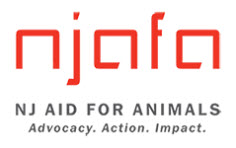CAMDEN — In the backyard of a home plunked oddly in the middle of one of Camden’s most industrial areas in South Camden, life for “Reds” isn’t easy.
If anything, it’s a pretty lonely existence. The pit bull with the shiny brown coat has been living in the backyard of his owner’s grandmother’s house. The dog is larger than the woman taking care of it.
“I feed him every day, but I don’t want to get close to him,” said “Victoria,” wringing her hands in the afternoon sunlight Tuesday, several yards away from the growling dog laying claim to his territory.
Victoria couldn’t get into her backyard, where a doghouse and a plastic tarp have provided cover from the elements these past few weeks of winter. To feed the beast, she created a makeshift feeding system.
“See what she has rigged up?” asks Kathy McGuire, animal activist and president of NJ Aid for Animals, pointing at a rope hanging from the home’s second floor.
“She lowers the food down from the back bedroom window with a pulley system.”
This pup will stay here, even though he could easily roam the city. He doesn’t appear to be a danger, only content to stake his turf. He doesn’t faze McGuire, who talks to Reds as if he were an infant.
McGuire has made the welfare of animals here a priority in her life and has ramped up her efforts since Camden’s four animal control positions were eliminated in January when the city laid off more than 350 employees to close a $26.5 million budget gap. Two of the positions had been vacant.
At any given moment in the city, you can find a sick, hungry or abused animal. Whether it’s a pit bull being raised with a mean streak by an owner in Pyne Point or a group of feral cats in Morgan Village, the issue of pets leading tough lives plagues the city.
Picking up pets is an expensive business. Blackwood-based Available Animal Control was awarded a contract in January — not to exceed $190,970 — to provide services for a one-year period that began Feb. 11.
That’s just under $16,000 a month for three people to patrol 24 hours a day for strays, investigate animal cruelty cases, remove dead animals and educate the public on animal-related matters.
Camden City Council approved a contract with the Animal Welfare Society of Camden County this week to pay for shelter, food and care for stray animals found in the city. The $156,468 contract equates to approximately $13,000 per month.
The facility is the only one in the area that accepts animals from Camden. It’s also the only county shelter in the state that isn’t county-operated. The contract is for care of 2,301 animals for the calendar year. Any pet exceeding that carries an additional cost of $68 per creature.
Iraida Afanador, director of Code Enforcement for Camden City, said the contract with Available Animal Control has meant the city can eliminate $500,000 with animal control salaries, benefits and extra working hours factored in.
“We don’t have to deal with benefits or overtime, which can be costly,” Afanador said. “Also we’re seeing savings on gas, insurance, uniforms the other equipment and things necessary for animal control to operate. They all add up.”
She maintains nothing has changed in terms of the services provided to residents. Where two animal control officers previously patrolled the city, now there are three. Emergency cases such as bites, dog fighting and animal cruelty cases should be reported to the police.
McGuire said the city and charitable organizations like hers need to work together for the sake of Camden’s animals. Virtually every day, she has a list of pets in need of help scribbled on a legal pad.
She secures information through a network of sources in town such as community leaders and even probation officers, claiming “I’m not some gray-haired lady running around looking for cats — I know what I’m doing and what I’m looking for.”
One expert foresees plenty of work for McGuire in the coming weeks.
Dr. Nicholas Bello, a professor at Rutgers-New Brunswick’s School of Environmental and Biological Sciences, said as the weather warms, there’s an exponential increase in the animal population as food sources become more abundant.
“You have the population of wild dogs and cats that are going to be out,” Bello said.
“You tend to see a lot of cats beginning to give birth in the summer and things of that nature pose problems.”
A young mutt pit bull McGuire picked up in Bergen Square is evidence of that.
“Basically I just drive around and try to problem solve,” McGuire said. “It’s really about enriching lives and problem-solving.
“It’s pretty basic.”
Kathy McGuire of NJ Aid for Animals carries “Reds’ to a car after coaxing the pit bull from a South Camden backyard, where he proved too much for the home’s owner.
